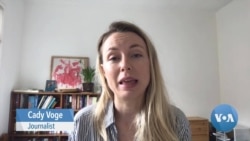A week ago, I was stocking the fridge and pantries in my apartment in Bogota, Colombia, and looking up DIY disinfectant spray recipes. I had every intention to stay put in my adopted home.
I moved there five years ago to learn Spanish and never left. My favorite compliment is when Colombians tell me that my accent in Spanish - though obviously gringo - is unmistakably Bogotano. I learned to be a journalist in Colombia, and it’s where my life is.
But a week ago, I realized I would have to up-end my life, at least temporarily. And as this novel coronavirus spreads from one country to the next, similar realizations are occurring to everyone I know. You were moving through in life at your normal pace and suddenly you looked up and everything around you was in fast-forward.
If you’re in China or Italy, the moment when you switched from the old normal to the new may seem like a lifetime ago, but here in the Western Hemisphere, our heads are still spinning.
It hit me when my friends and fellow freelance journalists, Dylan Baddour and Pu Ying Huang, found out that they were stuck in Peru. They had just called it quits on a farewell tour of South America and were about to take a 14-hour bus trip to Lima when they learned that all commercial flights would be grounded until the end of the month.
“We were too late, and it happened just like that,” Huang said. They will not be able to get home to Texas until at least next month.
This year I need to travel frequently to Seattle to finish a documentary about an asylum-seeking family that I met two years ago on a migrant caravan in Mexico. Seattle (where I need to work) and San Francisco (where my family could host me) are among the most affected areas of the United States, while Colombia had fewer than 100 reported cases a week ago. But I decided that I couldn’t risk getting stuck in Colombia for months and miss the chance to finish my film.
Plus, my parents wanted me home. “Families should be together in times of crisis,” is what my dad said when I asked him why it was important to them. So I bought a ticket and packed up everything I would need for an indefinite sojourn in the United States.
At the airport in Bogota, I passed through immigration and security in 10 minutes. The airport was much emptier than usual, though my flight was almost full. The woman sitting next to me told me she works in Colombia but was heading home to Taiwan, because of “the situation.”
Roughly one in four people I encountered that day was wearing a mask. At baggage claim in Houston I met Michael Jarboe, who had cut short his Spring Break vacation and was re-routing to stay with his girlfriend in San Diego instead of returning to graduate school in New York. He described his day of travel as “surprisingly easy. I guess because people are starting to hunker down and shelter in.”
Julio Velez was returning two weeks early from a business trip in Colombia, and described his day as “scary to say the least.”
Ben Cunningham and his wife were heading home to Seattle after a one-week vacation in Mexico. They almost cut their trip short because they thought they had contracted coronavirus, but it turned out to be allergies. “We’re a little paranoid at the moment,” he said.
There were only 29 people on my flight from Houston to San Francisco, where two days earlier, local officials had ordered residents to “shelter in place.” Four days later, Governor Gavin Newsom imposed the same restrictions on all of California, allowing people to leave their homes only for essential activities.
When the nearly empty flight landed in San Francisco, I immediately felt the tension. Some of the people who weren’t already wearing face masks put them on before deplaning. My sister picked me up at the curb; no hugging, just laughs about how the whole car smelled like hand sanitizer.
When I arrived at her house, I showered and immediately put my clothes in the washing machine, and my suitcase in the garage.
After two weeks in quarantine at my sister’s house I’ll be able to see my parents, who are in their mid-60s and therefore at high risk. As a freelancer I don’t have job security, so the next few months come with a lot of uncertainty, but at least now I’m with family.
When I woke up on my first morning back in my hometown, I asked my 5-year-old nephew what the plan was for the day. “We’re going to make chocolate chip cookies,” he told me. I’ve got everything I need for life to slow down for a little while.





